Education behemoth CEO
.gif) Ranu Kawatra, president and chief executive of Pearson Education (India). The London-based Pearson Plc (aka Pearson Group) is arguably the world’s largest and most diversified education and publishing conglomerate (revenue: £5.9 billion or Rs.50,740 crore in 2011), and has a diverse business mix comp-rising textbooks publishing, digital learning, online testing and assessment, bricks-n-mortar institutions and online and vocational education. The company maintained a low profile in India until January last year when it invested a massive $127 million (then Rs.577 crore) to acquire a 76 percent equity stake in the Bangalore-based Tutor Vista Pvt. Ltd. Since then, Pearson Education — the major business division of the Pear-son Group — has rolled out its products and services in India with rapid speed.
Ranu Kawatra, president and chief executive of Pearson Education (India). The London-based Pearson Plc (aka Pearson Group) is arguably the world’s largest and most diversified education and publishing conglomerate (revenue: £5.9 billion or Rs.50,740 crore in 2011), and has a diverse business mix comp-rising textbooks publishing, digital learning, online testing and assessment, bricks-n-mortar institutions and online and vocational education. The company maintained a low profile in India until January last year when it invested a massive $127 million (then Rs.577 crore) to acquire a 76 percent equity stake in the Bangalore-based Tutor Vista Pvt. Ltd. Since then, Pearson Education — the major business division of the Pear-son Group — has rolled out its products and services in India with rapid speed.
Among the major business verticals of Pearson Education which are already operational in India are Pearson Vue (which provides online testing services to clients under controlled conditions in its test centres); Pearson Clinical and Talent Assessment (psychological and cognitive evaluation); Tutor Vista (online tutoring); Pearson Test of English — Academic (English language testing); Pearson K-12 (primary- secondary education); and vocational education (IndiaCan, a joint venture with Educomp Solutions Ltd, Delhi); Edexcel (school leaving examinations and certification) and textbooks publishing.
“We are the only company in the country with a full suite of education services ranging from publishing, assessments and tutoring to awarding certification,” says Kawatra, a commerce and business management alum of Delhi University who served with the shaving products transnational Gillette for almost two decades and iDiscoveri Education before taking charge of Pearson Education (India) in April last year.
Preschool education fast-tracker
.gif) Prajodh Rajan, chief executive EuroKids International Ltd (EIL, estb. 1998). With 29 owned and 783 franchised preschools with an enrolment of 55,000 pupils, EIL is the country’s largest preschool education company.
Prajodh Rajan, chief executive EuroKids International Ltd (EIL, estb. 1998). With 29 owned and 783 franchised preschools with an enrolment of 55,000 pupils, EIL is the country’s largest preschool education company.
A business management graduate of Madras University, Rajan signed up with EIL in 1999 when it was a wholly-owned subsidiary of Egmont Inter-national Holdings, a Denmark-based children’s books publishing company.
In 2004 together with three of his colleagues (Uday Mathur, Ganesh Vishwanathan and Vikas Phadnis), Rajan bought out Egmont’s share-holding in EIL and set the company on a fast-growth track in the preschool sector, which has mercifully been spared the heavy hand of government regul-ation. As a result over 50,000 preschools have mushroomed countrywide mainly under the franchise model.
Although some education purists decry the franchise model on grounds that the quality of learning dispensed tends to be uneven, by introducing, testing and improving ECE play-n-learn pedagogies within EIL’s 29 owned preschools, the company has made standardised, high-quality, globally benchmarked preschool education accessible to hundreds of thousands of middle class households countrywide.
Conservation philanthropist
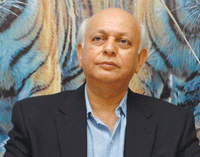 Hemendra Kothari, promoter-chairman of the Hemendra Kothari Foundation (estb. 2008), a Mumbai-based philanthropic organisation focused on wildlife conservation, education and health. A former Bombay Stock Exchange heavyweight (D.S Purbhoodas & Co) and former chairman of DSP Merrill Lynch, Kothari sold his interest in the firm to Merrill Lynch and the Bank of America for over $500 million in the period 2005-09. Currently he chairs DSP Blackrock Investment Managers Pvt. Ltd, a private equity and mutual funds firm which manages assets of over Rs.41,000 crore.
Hemendra Kothari, promoter-chairman of the Hemendra Kothari Foundation (estb. 2008), a Mumbai-based philanthropic organisation focused on wildlife conservation, education and health. A former Bombay Stock Exchange heavyweight (D.S Purbhoodas & Co) and former chairman of DSP Merrill Lynch, Kothari sold his interest in the firm to Merrill Lynch and the Bank of America for over $500 million in the period 2005-09. Currently he chairs DSP Blackrock Investment Managers Pvt. Ltd, a private equity and mutual funds firm which manages assets of over Rs.41,000 crore.
An enthusiastic and committed wildlife conservationist, Kothari promoted the eponymous foundation to reduce the dependence of tribal people residing in habitations abutting wildlife sanctuaries on thinning and depleting forests.
Currently HKF supports NGOs working with over 100 schools sited near the Ranthambhore, Pench, Tadoba, Andhari and Mudhumalai tiger reserves, educating and upskilling children to prepare them for employment in non-traditional occupations. Moreover, HKF supports 21 schools run by the Nashik Education Society with an aggregate enrolment of 27,000 students. “We hope to favourably impact and upgrade neglected communities living near forests. This will stablilise the fragile environments in which tiger reserves and sanctuaries are located,” says Kothari.
Navneet architects
Amarchand, Dungarshi, Harakchand, Shanti & Jitendra Gala, promoter-directors of Navneet Publications (India) Ltd (estb. 1959). A low-profile Mumbai-based school textbooks publishing company, Navneet has established an excellent reputation over the past half century. Currently the company which commissions, prints and publishes textbooks mapped with the syllabuses of the state examination boards of Maharashtra and Gujarat, has more than 5,000 educational, preschool and general titles in print.
The company’s high-quality textbooks are prescribed by 25,000 nurseries, primary and secondary schools reaching over 30 million students in the country’s premier industrial states. With 2,800 employees on its muster roll, Navneet Publications (annual revenue: Rs.610 crore) is the sole textbooks publishing company listed on the Bombay Stock Exchange.
In 2008, it entered the digital learning space and currently its digitised texts — marketed under the brand eSense — are being prescribed in 925 primary-secondaries in Maharashtra and Gujarat. Moreover the company has also diversified its operations to enter the schools management and brick-n-mortar preschools businesses. Currently Navneet provides management services and advice to over 80 schools in Andhra Pradesh, and has promoted three preschools in Mumbai and one in Pune under the Leapbridge brand name.
Reformist CBSE chief
.gif) Vineet Joshi, chairman, Central Board of Secondary Education (CBSE). An alumnus of IIT Kanpur and IIFT Delhi and an IAS officer of the 1992-batch, Joshi was appointed pro tem chairman in 2008 and chairman of CBSE — the country’s largest pan-India school leaving examination board with 12,250 schools in India and overseas including 141 in 21 countries affiliated with it — in February 2010.
Vineet Joshi, chairman, Central Board of Secondary Education (CBSE). An alumnus of IIT Kanpur and IIFT Delhi and an IAS officer of the 1992-batch, Joshi was appointed pro tem chairman in 2008 and chairman of CBSE — the country’s largest pan-India school leaving examination board with 12,250 schools in India and overseas including 141 in 21 countries affiliated with it — in February 2010.
Since then during the past few years he has introduced several path-breaking curriculum and examination reforms in CBSE affiliated schools. Among them: introduction of the CCE (continuous and comprehensive evaluation) system; making the class X board exam optional for higher secondary school students; introducing in-school formative and summative assessment systems, and mandating evaluation of co-curricular skills (attitudes and values, literary, creative and scientific skills, aesthetic sensibilities and performing arts).
Moreover the curricula of CBSE schools has been enriched through the introduction of vocational education in secondary school, and optionals such as mass media studies, design, hospitality management, healthcare sciences and financial market management for higher secondary students.
Joshi is also credited for streamlining CBSE’s affiliation process by introducing online affiliation for schools and the launch of CBSE’s contemporary and information-rich website www.cbseacademic.in last month (May).
Exemplary soldier educationist
.gif) Lt. Gen (Retd). Arjun Ray, VSM, PVSM, chief executive of the Indus Trust (estb. 2003) and Indus International Schools (Bangalore, Hyderabad and Pune). An alumnus of the Staff College, Camberley, UK, and the National Defence College, New Delhi, Ray served the Indian Army with distinction for 38 years before he retired in 2002. In his last assignment before retirement, he commanded the newly raised 14 Corps in Ladakh where to win the hearts and minds of the people and ward off the threat of insurgency in this sensitive border area, he conceptualised the education-driven Operation Sadbhavna (goodwill). Under this programme, he promoted 13 primary schools, 11 women’s empowerment and 60 adult education centres along the line of control in Jammu and Kashmir.
Lt. Gen (Retd). Arjun Ray, VSM, PVSM, chief executive of the Indus Trust (estb. 2003) and Indus International Schools (Bangalore, Hyderabad and Pune). An alumnus of the Staff College, Camberley, UK, and the National Defence College, New Delhi, Ray served the Indian Army with distinction for 38 years before he retired in 2002. In his last assignment before retirement, he commanded the newly raised 14 Corps in Ladakh where to win the hearts and minds of the people and ward off the threat of insurgency in this sensitive border area, he conceptualised the education-driven Operation Sadbhavna (goodwill). Under this programme, he promoted 13 primary schools, 11 women’s empowerment and 60 adult education centres along the line of control in Jammu and Kashmir.
Gen. Ray’s initiatives in education which were widely acclaimed in India and abroad, attracted the interest of Kumar Malavalli, a Silicon Valley (USA)-based IT tycoon of Indian origin, who invited him to promote the high-end, IBO-affiliated Indus International School, Bangalore (IIS-B) under the aegis of the Indus Trust. IIS-B was not only constructed in record time but over the past seven years has quickly established a global reputation as an excellent IB K-XII academy. In the EW-C fore India’s Most Respected Schools Survey 2011, IIS-B was ranked the country’s second most respected international school behind Woodstock, Mussoorie (estb. 1852). Since then, the trust has promoted Indus International schools in Pune and Hyderabad with the three schools boasting an aggregate enrolment of 1,700 students from over 50 countries around the world. Moreover, in an exceptional initiative, the trust has promoted a parallel free school on the Indus International, Bangalore campus which offers the IB primary years curriculum to over 300 children.
Child rights champion
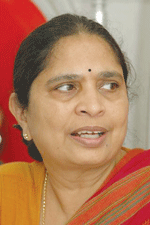 Dr. Shantha Sinha, chairperson National Commission for Protection of Child Rights (NCPCR). Well-known in NGO circles as founder of the MV Foundation, which has rehabilitated over 400,000 child workers by enroling them in schools, Sinha was appointed the first chairperson of NCPCR in 2007.
Dr. Shantha Sinha, chairperson National Commission for Protection of Child Rights (NCPCR). Well-known in NGO circles as founder of the MV Foundation, which has rehabilitated over 400,000 child workers by enroling them in schools, Sinha was appointed the first chairperson of NCPCR in 2007.
Established in March 2007 as a statutory body under the Commissions for Protection of Child Rights Act, 2005, NCPCR’s broad mandate is to protect, promote and defend child rights countrywide. It has been vested with powers of a civil court to inquire into complaints and take suo motu notice of matters related to deprivation and violation of child rights. NCPCR is also the apex level monitoring authority of the Right to Education Act, 2009, and set up an RTE division in February 2010 to receive and address complaints of denial of the fundamental right to elementary education.
Recipient of the Padma Shri and Ramon Magsaysay awards, Sinha has used her two decades of experience as a child rights activist to create nationwide awareness of children’s rights and societal obligations towards them, initiating interaction with state governments, corporates, and NGOs to gather support for children’s causes.
DPS Society chairman
.gif) Ashok Chandra, chairman of Delhi Public School (DPS) Society. An alumnus of Allahabad University who was inducted into the IAS in 1959, Chandra served as secretary to the government of India in the ministries of oil and petroleum, heavy industry, information and broadcasting. After retirement, he was elected chairman of the DPS Society in 2006 and re-elected in 2010. During his six-year tenure, Kumar has metamorphosed into the driving force of DPS Society which runs 140 Delhi Public Schools (including 11 society-owned schools) with an aggregate enrolment of 275,000 students instructed by 10,000 teachers in India and abroad.
Ashok Chandra, chairman of Delhi Public School (DPS) Society. An alumnus of Allahabad University who was inducted into the IAS in 1959, Chandra served as secretary to the government of India in the ministries of oil and petroleum, heavy industry, information and broadcasting. After retirement, he was elected chairman of the DPS Society in 2006 and re-elected in 2010. During his six-year tenure, Kumar has metamorphosed into the driving force of DPS Society which runs 140 Delhi Public Schools (including 11 society-owned schools) with an aggregate enrolment of 275,000 students instructed by 10,000 teachers in India and abroad.
Run on the franchise model with the owned schools testing and prescribing minimum infrastructure norms and curriculum, DPS schools have established an excellent national reputation for delivering standardised secondary education of high quality, much appreciated by India’s rising new middle class. Indeed the DPS model has proved so popular that DPS schools have been established as far afield as Singapore, Thailand, Malaysia and several Middle East countries.
The excellent reputation of DPS schools is testified by the inclusion of 19 DPS primary-secondaries headed by DPS, R.K. Puram, Delhi in the EW-C fore India’s Most Respected Schools Survey 2011 league table. Currently 300 affiliation applications from educators are pending consideration of the DPS Society.
Influential NUEPA chief
.gif) Dr. R. Govinda, vice chancellor of National University of Educational Planning and Administration (NUEPA), New Delhi. A former professor of the Institute of Education, University of London, M.S. University, Baroda and International Institute of Educational Planning, UNESCO, Govinda was appointed vice chancellor of the country’s premier education university in 2010.
Dr. R. Govinda, vice chancellor of National University of Educational Planning and Administration (NUEPA), New Delhi. A former professor of the Institute of Education, University of London, M.S. University, Baroda and International Institute of Educational Planning, UNESCO, Govinda was appointed vice chancellor of the country’s premier education university in 2010.
Promoted by Unesco in 1962 as the Asian Regional Centre for Educational Planners and Administration, it was taken over by the Union government in 1970 and renamed the National Staff College for Education Planners and Administration. In 1979 the college was again renamed NIEPA and upgraded into a national university in 2006. Today NUEPA’s role is to provide professional services to the Union government on capacity building in education, policy planning, management, research, training and consultancy. In 1995 this institution devised a unique software program christened DISE (District Information System), with which it has been conducting detailed, in-depth surveys of primary education infrastructure, enrolment and related information, in 605 districts countrywide. This massive data gathering exercise is contained in a data-rich and valuable annual report — Elementary Education in India (EEI). Published by NUEPA, EEI offers an accurate picture of the condition of primary and upper primary education in India.
With its annual EEI reports well-established, NUEPA has launched two new ambitious projects — All India Survey of Higher Education to collect reliable data on all public and private institutions of higher education, and Secondary Management Information System to gather data on all secondary schools countrywide. Moreover, as member of the Central Advisory Board of Education (CABE) and the National Advisory Committee on Right to Education of the government of India, Govinda is an influential proponent of reforms in primary and higher education.
Primary education innovator
.gif) Madhav Chavan, promoter-chief executive of Pratham. A chemistry alumnus of Ohio State University, USA and former reader in physical chemistry at Mumbai University, in 1989 Chavan switched tracks to enter the primary education sector and co-promoted Pratham — an NGO committed to universalising and upgrading elementary education in India — in 1994. Since then Pratham has emerged as the largest education NGO countrywide with an annual budget of Rs.75 crore. Operational in 17 states, Pratham has reached over 30 million children through its supplementary and remedial reading and basic maths programmes.
Madhav Chavan, promoter-chief executive of Pratham. A chemistry alumnus of Ohio State University, USA and former reader in physical chemistry at Mumbai University, in 1989 Chavan switched tracks to enter the primary education sector and co-promoted Pratham — an NGO committed to universalising and upgrading elementary education in India — in 1994. Since then Pratham has emerged as the largest education NGO countrywide with an annual budget of Rs.75 crore. Operational in 17 states, Pratham has reached over 30 million children through its supplementary and remedial reading and basic maths programmes.
Also active in teacher training, curriculum development and education research, since 2005 Pratham has been publishing its Annual Status of Education Report (ASER) which assesses actual learning outcomes in rural (mainly government) primary schools countrywide. This much acclaimed independent audit of government primaries is conducted by 20,000 ASER volunteers — mainly college students — who fan out into 558 of the country’s 630 districts. ASER 2011 reveals that the quality of primary education dispensed in rural India has been steadily deteriorating with over 48.2 percent of children in class V unable to read and comprehend class II texts and 61 percent unable to solve simple two-digit subtraction sums.
Sports education champion
.gif) Saumil Majmudar, co-founder and chief executive of Edusports Pvt. Ltd, Bangalore. An alumnus of IIT-Bombay and IIM-Bangalore, Majmudar began his professional career with the IT major Wipro (research and development) in 1995. In 1998 he went solo and started Learn@Home — a personalised computer training business. A year later, he promoted QSupport — among the first remote tech support businesses out of India.
Saumil Majmudar, co-founder and chief executive of Edusports Pvt. Ltd, Bangalore. An alumnus of IIT-Bombay and IIM-Bangalore, Majmudar began his professional career with the IT major Wipro (research and development) in 1995. In 1998 he went solo and started Learn@Home — a personalised computer training business. A year later, he promoted QSupport — among the first remote tech support businesses out of India.
In 2003 this never-say-die entrepreneur promoted SportzVillage, a firm providing fitness, football and athletics training on a sports field rented in suburban Bangalore. Since then, SportzVillage has morphed into SportzConsult (sports management) and EduSports Pvt. Ltd (estb.2009) which raised venture capital of Rs.4.5 crore in 2010. “EduSports was promoted to create a generation of ‘champions in life’ — healthier and fitter children equipped with key life-skills — all through the magic of sports,” says Majmudar.
And even if belatedly, the parents, educators and teachers communities seem to be heeding Majmudar’s message of the vital importance of sports education. The number of client schools in which the company’s fitness training and sports education programmes are mandatory, has risen to 200 with over 150,000 children experiencing the magic of sports under the per student per month (fees: Rs.100-150) business model.
Teach for India motivator
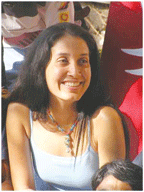 Shaheen Mistri, founder CEO of Teach For India. An alumna of Mumbai and Manchester universities, Mistri is also founder of the Akanksha Foundation (estb.1991), which offers supplementary education to 3,500 underprivileged children in Mumbai and Pune. In 2008, Mistri accepted an offer to spearhead Teach for India, an initiative of Teach to Lead, a Mumbai-based NGO.
Shaheen Mistri, founder CEO of Teach For India. An alumna of Mumbai and Manchester universities, Mistri is also founder of the Akanksha Foundation (estb.1991), which offers supplementary education to 3,500 underprivileged children in Mumbai and Pune. In 2008, Mistri accepted an offer to spearhead Teach for India, an initiative of Teach to Lead, a Mumbai-based NGO.
Modelled on the highly successful Teach for America programme founded by Wendy Kopp in 1989, Teach For India is a high-potential initiative under which outstanding college graduates and professionals commit two years to teach full-time in under-resourced low-income schools in an effort to end “inequity in education”. Over the past three years Teach For India has placed 370 fellows (paid a monthly stipend of Rs.15,000 plus housing allowance) in 122 schools in Mumbai, Pune and Delhi.
An inspiring educator, through Teach For India Mistri has motivated some of India’s brightest college graduates and professionals to volunteer to spend two years in under-resourced classrooms, and committ to bridging the gap in school education.
Affordable schools promoter
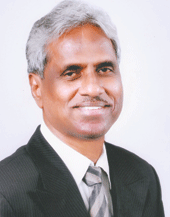 M. Venkata Narayana is the Hyderabad-based chairman of Gowtham Model Schools (GMS) and K-12 Techno Services Pvt. Ltd, which offers education consultancy services. Promoted in 2002 with the mandate to offer affordable quality educ-ation, the Hyderabad-based GMS chain has lengthened rapidly. Curr-ently it comprises 70 K-10 schools with an aggregate enrolment of 50,000 students and 3,000 teachers in 48 towns and cities in the southern state of Andhra Pradesh (pop. 84 million).
M. Venkata Narayana is the Hyderabad-based chairman of Gowtham Model Schools (GMS) and K-12 Techno Services Pvt. Ltd, which offers education consultancy services. Promoted in 2002 with the mandate to offer affordable quality educ-ation, the Hyderabad-based GMS chain has lengthened rapidly. Curr-ently it comprises 70 K-10 schools with an aggregate enrolment of 50,000 students and 3,000 teachers in 48 towns and cities in the southern state of Andhra Pradesh (pop. 84 million).
Affiliated with the Andhra Pradesh state exam board, all Gowtham Model Schools offer technology-enabled English-medium K-10 education on contemporary campuses at affordable prices. Now the group, which also runs ten junior (classes XI-XII) colleges and the well-reputed CBSE-affiliated Orchid International School, Hyderabad, is going national with a target of promoting 250 greenfield schools in Madhya Pradesh, Maharashtra, Gujarat and Rajasthan.
The distinguishing feature of GMS is that they offer high-quality technology-enabled education at affordable tuition fees of Rs.1,000-1,500 per month, catering to the huge demand from parents for affordably priced English-medium K-10 education. In the process, Venkata Narayana has made English-medium school education accessible to over 30,000 aspirational households in Andhra Pradesh.
World’s largest open school chief
 Sitansu S. Jena, chairman National Institute of Open Schooling (NIOS). An alumnus of Kurukshetra University awarded a Ph D in education from the Institute of Social and Economic Change, Bangalore, Jena served with the Indira Gandhi National Open University (IGNOU) for over two decades before being appointed chairman of NIOS in 2009.
Sitansu S. Jena, chairman National Institute of Open Schooling (NIOS). An alumnus of Kurukshetra University awarded a Ph D in education from the Institute of Social and Economic Change, Bangalore, Jena served with the Indira Gandhi National Open University (IGNOU) for over two decades before being appointed chairman of NIOS in 2009.
Established by the Central government in 1989, with the stated objective of “providing education to those who are unable to attend school for a variety of socio-economic reasons and meeting the educational needs of differently abled children for creating an inclusive education system”, NIOS has played a critical role in providing a second chance to school dropouts, challenged children and adults to access, resume and continue secondary education. Over the past 23 years, NIOS has tutored and certified 1.28 million students aged 14 years-plus as class X school-leavers; 1.03 million senior secondary (class XII) students and provided 150,000 with vocational education and train-ing. Currently an estimated 2.02 million students are enroled in its secondary, senior secondary, and vocational education distance learning programmes supported by 3,994 accredited institutions countrywide.
Since taking charge of the world’s largest open school, Jena has taken important steps to raise public awareness and acceptability of certification awarded by this low-profile institute/examination board. High on his agenda is revision of the NIOS curriculum, integration of ICT and online technologies to improve learning outcomes, and introduction of industry relevant VET and adult education programmes.
English-medium missionary
.gif) Deepak Madhok, chairman of the Varanasi-based Sunbeam Group of educational institutions (estb.1972) comprising 13 CBSE-affiliated schools with an aggregate enrolment of 20,000 students and 2,000 faculty. Sunbeam School, Lahartara was ranked Varanasi’s No. 1 day school and among the top five in Uttar Pradesh —India’s most populous state — in the EducationWorld-C fore India’s Most Respected Schools Survey 2011.
Deepak Madhok, chairman of the Varanasi-based Sunbeam Group of educational institutions (estb.1972) comprising 13 CBSE-affiliated schools with an aggregate enrolment of 20,000 students and 2,000 faculty. Sunbeam School, Lahartara was ranked Varanasi’s No. 1 day school and among the top five in Uttar Pradesh —India’s most populous state — in the EducationWorld-C fore India’s Most Respected Schools Survey 2011.
The seeds of the Sunbeam Group were planted four decades ago by Dr. Amrit Lal Madhok and Deesh Madhok who promoted the first Sunbeam School in the Bhagwanpur area of the holy city of Varanasi. In 1990, their son Deepak, an alumnus of Benaras Hindu and Allahabad universities, then a civic administrator in the Uttar Pradesh Public Service Commission, took the hard decision of quitting the civil service to help his parents realise their mission of “providing world-class English-medium education to the children of Uttar Pradesh”. Since then, Deepak has transformed the Sunbeam Group into one of UP’s fastest growing school chains by promoting schools in Annapurna (1996), Lahartara (2002), Varuna (2002) — all in Varanasi — and Mughalsarai (2004). In April last year, four new CBSE-affiliated Sunbeam K-12 schools sited in the cities of Jaunpur, Allahabad, Ghazipur and Mau — across the Hindi heartland state of Uttar Pradesh — admitted their first batches of students.
Madhok’s special achievement is that in the educationally backward and lawless state of Uttar Pradesh, he has nurtured an excellent group of education institutions providing children with high-quality English-medium education, knowledge and skills.
Rural science education pioneer
.gif) Ramji Raghavan, founder-chairman Agastya International Foundation, Bangalore. An alumnus of Delhi University and the London Business School, Raghavan threw up a promising 20-year, London-based career in banking and finance (Citibank and Cedel) to return to India to promote Agastya — an NGO focused on providing hands-on science and technology education to rural children — in 1999.
Ramji Raghavan, founder-chairman Agastya International Foundation, Bangalore. An alumnus of Delhi University and the London Business School, Raghavan threw up a promising 20-year, London-based career in banking and finance (Citibank and Cedel) to return to India to promote Agastya — an NGO focused on providing hands-on science and technology education to rural children — in 1999.
Agastya’s first initiative — a unique, state-of-the-art science education centre for rural children set in a 172-acre campus in Kuppam, Andhra Pradesh — became operational in 2000. Now this unprecedented Rs.30-crore facility provides hands-on physics, chemistry, biology and maths learning to over 500 class III-X children and 40 teachers from government schools in neighbouring villages and districts who are bussed in daily to the campus. Over the past 13 years since it was promoted by a group of educationists and scientists led by Raghavan, Agastya (budget: Rs.12 crore in 2010-11) has reached 5 million children and 150,000 teachers (mainly from rural government schools) in ten states countrywide.
Every day, in a rare feat of organis-ational efficiency and management, 259 Agastya teacher-instructors dissem-inate hands-on science education to over 4,800 children from government schools in ten states through its major science centre in Kuppam, 28 satellite science centres, 61 mobile science vans, and science fairs. In the process, Agastya has engineered a scalable model for sparking a belated science education revolution in rural India.
Symbiosis Group inheritor
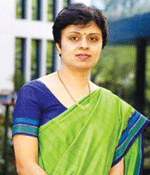 Dr. Vidya Yeravdekar, principal-director Symbiosis Society which manages 37 education institutions including the Symbiosis International University, Pune. Founded by her father the legendary Dr. S.B. Mujumdar in 1971, the Symbiosis Group now comprises 37 education institutions spread across 19 campuses with an aggregate enrolment of 27,000 students. In 2001, Yeravdekar at her father’s invitation took charge as joint director and later principal-director of the society, and manages all day-to-day operations and expansion initiatives of the group.
Dr. Vidya Yeravdekar, principal-director Symbiosis Society which manages 37 education institutions including the Symbiosis International University, Pune. Founded by her father the legendary Dr. S.B. Mujumdar in 1971, the Symbiosis Group now comprises 37 education institutions spread across 19 campuses with an aggregate enrolment of 27,000 students. In 2001, Yeravdekar at her father’s invitation took charge as joint director and later principal-director of the society, and manages all day-to-day operations and expansion initiatives of the group.
With the society’s showpiece Symbiosis International University having established a national reputation for academic excellence, under Yeravdekar’s leadership over the past decade the Symbiosis Group has expanded rapidly promoting a campus in Dubai and acquiring 300 acres of land in Pune to construct a Symbiosis Knowledge Village.
New AICTE helmsman
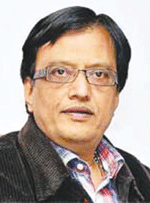 Dr. S. S. Mantha, chairman, All India Council for Technical Education (AICTE). A former professor of mechanical engineering at VJTI, Mumbai and hitherto pro vice chancellor of SNDT Women’s University, Mantha was appointed vice chairman of AICTE in 2009. Following the unceremonious exit of former chairman R.A. Yadav who was suspended by the Union HRD ministry on corruption charges, Mantha was elevated to the position of chairman in January this year.
Dr. S. S. Mantha, chairman, All India Council for Technical Education (AICTE). A former professor of mechanical engineering at VJTI, Mumbai and hitherto pro vice chancellor of SNDT Women’s University, Mantha was appointed vice chairman of AICTE in 2009. Following the unceremonious exit of former chairman R.A. Yadav who was suspended by the Union HRD ministry on corruption charges, Mantha was elevated to the position of chairman in January this year.
Established in 1945, through its subsidiary the National Board of Accreditation, AICTE supervises, regulates and accredits engineering and technical, business management, phar-macoepial, nursing, hotel management, etc, education in India. All major engineering, pharmacy colleges and B-schools need to be ‘recognised’ by AICTE and accredited by NBA, prominent exceptions being the IITs.
A highly-respected academic and administrator, Mantha has lost no time and has begun a much-needed clean-up drive to infuse transparency and accountability into the council’s administration and accreditation processes. To restore the faith of stakeholders in AICTE, he intends to strengthen the council’s e-governance initiatives, streamline the process of recognition/accreditation of new colleges and programmes, and provide comprehensive statistics on technical education in the country. Dr. Mantha is also helping prepare a National Vocational Education Qualification framework.
Vocational education spearhead
 Dilip Chenoy, managing director National Skills Development Corporation (NSDC). An alumnus of Delhi University and former director general of the Society of Indian Automobile Manufacturers and deputy director general of the Confederation of Indian Industry (CII), Chenoy took charge of NSDC in May last year.
Dilip Chenoy, managing director National Skills Development Corporation (NSDC). An alumnus of Delhi University and former director general of the Society of Indian Automobile Manufacturers and deputy director general of the Confederation of Indian Industry (CII), Chenoy took charge of NSDC in May last year.
Promoted by the Union government and several representative associations of industry including CII, FICCI and Assocham, NSDC is a first-of-its-type PPP (public-private partnership) not-for-profit organisation to stimulate skills development education countrywide. Established in October 2009 with a corpus of Rs.1,000 crore, of which 51 percent is contributed by the private sector, NSDC’s mandate is to fund competent education entrepreneurs and NGOs to establish vocational education and training (VET) centres across the country.
In the past one year, NSDC has approved 28 VET proposals of private entrepreneurs with an aggregate outlay of Rs.668 crore. This year it has targeted approval of 32 new proposals which will train between 15-20 million people over ten years. Committed to encouraging private sector initiatives in VET, Chenoy has used his organisational management experience to get this high-potential initiative off to a good start by speedily clearing funding proposals.
RTE Act monitor
.gif) Ambarish Rai, convener Right to Education (RTE) Forum, a coalition of over 10,000 NGOs including NAFRE, Save the Children, Campaign against Child Labour, Unicef, Oxfam-India, National Coalition for Education, among others.
Ambarish Rai, convener Right to Education (RTE) Forum, a coalition of over 10,000 NGOs including NAFRE, Save the Children, Campaign against Child Labour, Unicef, Oxfam-India, National Coalition for Education, among others.
Since the Right to Free and Compulsory Education (RTE) Act, 2009 came into force on April 1, 2010, the RTE Forum has presented an annual report to the nation on the implementation status of the Act countrywide. The RTE Forum’s latest stocktaking report released on April 3 this year, reveals that a staggering 95.2 percent of schools are non-compliant with infrastructure norms specified by the Schedule of the Act; 93 percent of teacher candidates failed the National Teacher Eligibility Test conducted by CBSE; 36 percent of sanctioned teaching posts are vacant; 99.68 percent children reported one or more types of punishment in school; and that the Central and state governments failed to spend 30 percent of the funds allocated for Sarva Shiksha Abhiyan (SSA)/RTE in 2010-11.
Also convener of the Peoples’ Campaign for a Common School System, Rai has coalesced over 10,000 child rights and education NGOs under the banner of the RTE Forum to transform into a pressure group for effective implementation of the RTE Act and force the Central and state governments to fulfil the promise of providing free and compulsory education to all children in the six-14 age group countrywide.
Educator extraordinaire
.gif) Shomie Das, education consultant and chairman of the Hyder-abad-based People Combine Educational Initiatives Pvt. Ltd (estb. 2009), an education services company. A physics alumnus of Calcutta and Cambridge univer-sities, Das has over three decades of experience of heading a clutch of India’s top-ranked legacy boarding schools. A former physics tutor to Prince Charles at the Gordonstoun School, Scotland, Das served as headmaster of Mayo College (1969-1974), Lawrence School, Sanawar (1974-1988) and his alma mater Doon School (1988-1995).
Shomie Das, education consultant and chairman of the Hyder-abad-based People Combine Educational Initiatives Pvt. Ltd (estb. 2009), an education services company. A physics alumnus of Calcutta and Cambridge univer-sities, Das has over three decades of experience of heading a clutch of India’s top-ranked legacy boarding schools. A former physics tutor to Prince Charles at the Gordonstoun School, Scotland, Das served as headmaster of Mayo College (1969-1974), Lawrence School, Sanawar (1974-1988) and his alma mater Doon School (1988-1995).
Post 1995 in his avatar as an education consultant, Das has planned the growth and development of 64 highly-reputed private schools including the Scottish High International and G. D. Goenka, Gurgaon; Ahlcon International, Delhi and Heritage School, Kolkata. Moreover as chairman of People Combine Educational Initiatives, he has supervised the promotion of five Oakridge schools in four cities. A much sought-after education consultant in India and abroad, respected for his years of experience and innovative ideas, Das has made an extraordinary contribution to the development of India’s world class private school education system.
Model schools commissioner
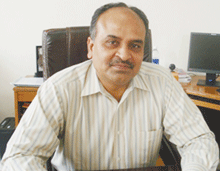 Avinash Dikshit, commissioner Kendriya Vidyalaya Sangathan (KVS), which administers 1,087 Kendriya Vidyalaya (KV) schools with an aggregate enrolment of 1.05 million students countrywide. An IIT-Kanpur graduate and a 1986 batch IDAS (Indian Defence Accounts Service) officer, Dikshit took charge as commissioner of KVS in 2010 following postings in Rwanda and Uttar Pradesh.
Avinash Dikshit, commissioner Kendriya Vidyalaya Sangathan (KVS), which administers 1,087 Kendriya Vidyalaya (KV) schools with an aggregate enrolment of 1.05 million students countrywide. An IIT-Kanpur graduate and a 1986 batch IDAS (Indian Defence Accounts Service) officer, Dikshit took charge as commissioner of KVS in 2010 following postings in Rwanda and Uttar Pradesh.
Promoted by the Central government as primary-secondaries for its employees, KVs have since emerged as model government schools with a reputation for academic excellence. Undoubtedly since the first 20 KVs were established in 1962-63, these Central government-funded schools have established a brand reputation on a par with the Central government promoted IITs and IIMs. Little wonder the approach paper to the Eleventh Plan (2007-12) officially called upon state governments to adopt KVs as the model for govern-ment schools countrywide to emulate.
Professional sports educator
.gif) Dev Roy, founder-managing director, FitKids Education and Training Pvt. Ltd, Bangalore. A graduate of R.V. College of Engineering, Bangalore with an MBA from the University of Chicago, Roy began his career with IBM, USA in 1995 followed by stints in the Bank of America, Dresdner Bank and Barclays Capital. However in 2009, he took a leap of faith to return to India and promote FitKids Education with the objective of delivering high-quality sports education to children and youth.
Dev Roy, founder-managing director, FitKids Education and Training Pvt. Ltd, Bangalore. A graduate of R.V. College of Engineering, Bangalore with an MBA from the University of Chicago, Roy began his career with IBM, USA in 1995 followed by stints in the Bank of America, Dresdner Bank and Barclays Capital. However in 2009, he took a leap of faith to return to India and promote FitKids Education with the objective of delivering high-quality sports education to children and youth.
In December 2009 FitKids Education launched its Leapstart programme for K-class XII children. Leapstart is an age-appropriate sports and physical fitness training programme for children to develop basic athletics and motor skills, designed in partnership with SPARK (Sports, Play and Active Recreation for Kids), a US-based research and public health organisation whose sports curriculum is being implemented in over 10,000 schools in 30 countries worldwide. Currently FitKids offers a menu of over 4,000 activities and games delivered by 300 full-time physical education professi-onals to over 60,000 students enroled in 100 schools in India and abroad.
By adapting and introducing SPARK’s intensively-researched fitness and sports education programme in K-12 education in India, Roy has infused profession-alism and expertise into ritual and arbitrary sports education dispen-sed in India’s schools system.
Inclusive education proponent
.gif) Dr. Narendra Jadhav, member Planning Commission. A highly-respected educationist, economist and policy maker, Dr. Jadhav’s sectoral responsibilities within the commission include education, labour, employment, skills develop-ment, sports and youth affairs, and social justice and empowerment.
Dr. Narendra Jadhav, member Planning Commission. A highly-respected educationist, economist and policy maker, Dr. Jadhav’s sectoral responsibilities within the commission include education, labour, employment, skills develop-ment, sports and youth affairs, and social justice and empowerment.
After having served with the Reserve Bank of India for over 31 years, in 2006 Dr. Jadhav was appointed vice chancellor of the University of Pune (UoP) — the largest university in the world with 612 affiliated colleges and 650,000 students. Within three years, under his leadership, UoP transformed into a favoured destination of foreign students with 45 percent of all foreign students in India enroled at UoP. A bestselling author whose autobiography Untouchables has sold over 400,000 copies, he is acknowledged as a Dalit icon who champions the cause of high-quality education opportunities and reservation in education institutions for India’s 166 million historically neglected Dalit population.
Also a member of the National Advisory Council chaired by Sonia Gandhi and of several Central government higher education committees, Dr. Jadhav is an influential voice in national education policy formulation.